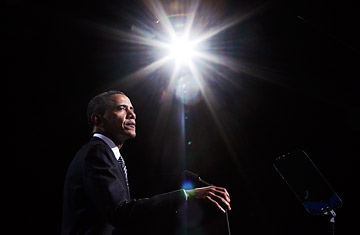
President Barack Obama pauses as he delivers remarks at a Gen44 fundraising event at Sony Studios in Los Angeles on April 21, 2011
One of the most notable outcomes of the dramatic news that Osama bin Laden has been killed is the feeling of unity across the American political and social spectrums. The event has triggered a shared sense of achievement, pride and common purpose. It is a mood that the U.S. has not felt for years as increasingly polarized political debates, on both serious and trivial issues, gradually gutted the operational middle of the country's political system.
After initial excitement, this moment of unity has largely been shrugged off by global markets as investors worry about the immediate risk of terrorist backlash and, more generally, the continued sense of malaise in the American economy. Yet bin Laden's death has the potential to become a turning point for the country, and for President Barack Obama in particular, if the spirit of cooperation can be translated into broad-based, bipartisan progress on economic issues that are central to the long-term well-being of the country and the world.
Unemployment remains stubbornly high. Youth joblessness is at alarming levels, with too many of the country's teenagers getting close to the point where they go from being unemployed to being unemployable. Various budget constraints have limited the scope for easy solutions, even if these were desirable. The debt and deficit dynamics are bad and deteriorating at both state and federal levels. A major rating agency, Standard & Poor's, has already taken the previously unthinkable step of placing the country's AAA credit rating on negative outlook. And Americans can no longer rely on their central bank for yet another round of imaginative pump priming to buy them time, options and flexibility.
In effect, America can't buy itself out of its economic problems, nor can it again kick the can down the road for much longer. Meanwhile, the rest of the world continues to outpace the U.S. in growth, competitiveness and wealth creation.
These structural problems were years in the making, and they require structural solutions that will need to be implemented steadfastly for a number of years.
Until this week, any reasonable hopes for such solutions were dashed by the extreme polarization of the American political process. Indeed, many Washington veterans have lamented the unapologetic lack of purpose, collaboration and common vision. Sustained and serious debates had become the exception rather than the norm.
A palatable change in the country's mood has the potential, but not the certainty, to change this. To seize the moment, Obama must push for a broad-based political agreement on a new set of economic solutions that America urgently needs to pursue. Here are a few to start with.
Unemployment must be seen as much more than a cyclical problem; it's a structural one that requires concurrent progress on job retraining, housing reform, education, social safety nets and private-sector competitiveness.
The country's deficit and debt problem can only be solved through simultaneous reforms to both expenditures and revenues. We have to talk not only about budget cuts but also tax reform.
Most importantly, America's political parties must jointly agree that progress on the structural-reform agenda cannot be held hostage to the specification of all the details. The important, and urgent, thing is to start the journey; we can always make midcourse corrections as needed.
Back in 2001, the 9/11 attacks orchestrated by bin Laden influenced the mood of America for years. Americans lost the bounce in their step, saw their country embroiled in wars abroad and worried about the mounting bills faced by an economy that was growing on the basis of unsustainable leverage and borrowed time.
Bin Laden's death cannot change all this. But, with skillful political leadership, it can mark the moment when America re-establishes the sense of unity and common vision that is so central to the success of structural reforms. Let us hope that this moment is seized — for the sake of both current and future generations, both in the U.S. and abroad.
El-Erian is the CEO of Pimco.
